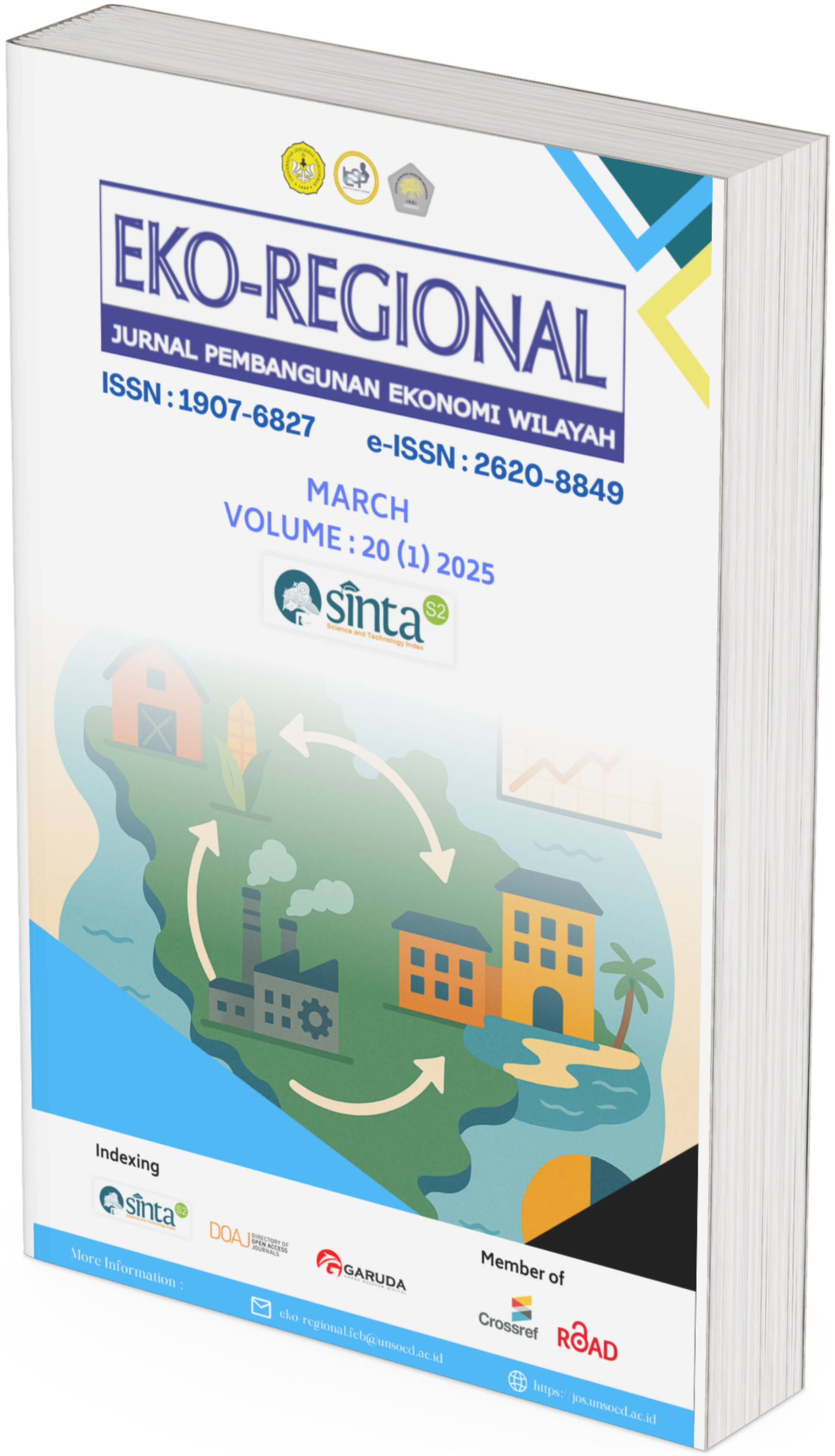Toward a Digitalized Economy: The Impact of Digital Index Performance on The Economic Growth in Indonesia
Abstract
Nowadays, the world relies heavily on digitalization. This study aims to analyze the effect of digitalization on economic growth in Indonesia. This study used panel data from 32 provinces in Indonesia, ranging from year 2017 to 2023. This study employed fixed and dynamic panel models with economic growth as the dependent variable and stock of capital and labor digitalization as independent variables. Digitalization is proxied by the access and infrastructure sub-index, the usage sub-index, and the skills sub-index. The estimation result shows that variables of stock of capital, labor, and digital economic development in Indonesia positively affect economic growth, and we also find that heterogeneity effects exist between different provinces. However, there is no significant effect on the dynamic panel models on generalized method moment. The results draw three implications: increasing investment in physical capital stock, improving human capital quality, and promoting Information and Communication Technology (ICT) readiness.
References
Baerlocher, D., Parente, S. L., & Rios-Neto, E. (2021). Female Labor Force Participation and economic growth: Accounting for the gender bonus. Economics Letters, 200, 109740. https://doi.org/10.1016/j.econlet.2021.109740
Bianchi, P., & Labory, S. (2022). Dynamic gravitation and structural dynamics: From Smith to Modern theory. Structural Change and Economic Dynamics, 60, 90–98. https://doi.org/10.1016/j.strueco.2021.11.009
Bond, S. (1991). Some tests of specification for panel data: monte carlo evidence and an application to employment equations. Review of Economic Studies, 58(2), 277–297. https://doi.org/10.2307/2297968
Bond, S. S., Hoeffler, A., & Temple, J. (2001). GMM Estimation of Empirical Growth Models. Economics Papers, 01, 33.
Calvano, E., & Polo, M. (2021). Market power, competition and innovation in digital markets: A survey. Information Economics and Policy, 54, 100853. https://doi.org/10.1016/j.infoecopol.2020.100853
Chu, A. (2022). The agricultural revolution and industrialization. African Agriculture, 158(May), 1–11. https://doi.org/10.1016/j.jdeveco.2022.102887
de Groot, E. A., Segers, R., & Prins, D. (2022). Non-resonating cycles in a dynamic model for investment behavior. Technological Forecasting and Social Change, 177, 121515. https://doi.org/10.1016/j.techfore.2022.121515
Donou-Adonsou, F. (2019). Technology, education, and economic growth in Sub-Saharan Africa. Telecommunications Policy, 43(4), 353–360. https://doi.org/10.1016/j.telpol.2018.08.005
Heeks, B. R. & R. (2017). Dedining,Conceptualising and Measuring the Digital Economy(Working Paper). Centra for Development Informatics, 32(University of Manchester), 45.
Huaping, G., & Binhua, G. (2022). Digital economy and demand structure of skilled talents — analysis based on the perspective of vertical technological innovation. Telematics and Informatics Reports, 7(May), 100010. https://doi.org/10.1016/j.teler.2022.100010
Irtyshcheva, I., Stehnei, M., Popadynets, N., Bogatyrev, K., Boiko, Y., Kramarenko, I., Senkevich, O., Hryshyna, N., Kozak, I., & Ishchenko, O. (2021). The effect of digital technology development on economic growth. International Journal of Data and Network Science, 5(1), 25–36. https://doi.org/10.5267/j.ijdns.2020.11.006
Kadigi, R. M. J., Robinson, E., Szabo, S., Kangile, J., Mgeni, C. P., De Maria, M., Tsusaka, T., & Nhau, B. (2022). Revisiting the Solow-Swan model of income convergence in the context of coffee producing and re-exporting countries in the world. Sustainable Futures, 4(May), 100082. https://doi.org/10.1016/j.sftr.2022.100082
Kahouli, B., & Chaaben, N. (2022). Investigate the link among energy Consumption, environmental Pollution, Foreign Trade, Foreign direct Investment, and economic Growth: Empirical evidence from GCC countries. Energy and Buildings, 266, 112117. https://doi.org/10.1016/j.enbuild.2022.112117
Lefophane, M. H., & Kalaba, M. (2020). Estimating effects of information and communication technology (ICT) on the productivity of manufacturing industries in South Africa. African Journal of Science, Technology, Innovation and Development, 12(7), 813–830. https://doi.org/10.1080/20421338.2020.1714175
Li, B., & Li, Y. (2022). On a chemotaxis-type Solow-Swan model for economic growth with capital-induced labor migration. Journal of Mathematical Analysis and Applications, 511(2), 126080. https://doi.org/10.1016/j.jmaa.2022.126080
Munguía, R., Davalos, J., & Urzua, S. (2019). Estimation of the Solow-Cobb-Douglas economic growth model with a Kalman filter: An observability-based approach. Heliyon, 5(6), e01959. https://doi.org/10.1016/j.heliyon.2019.e01959
Mura, P. O., & Donath, L. E. (2023). Digitalisation and Economic Growth in the European Union. Electronics (Switzerland), 12(7). https://doi.org/10.3390/electronics12071718
Myovella, G., Karacuka, M., & Haucap, J. (2020). Digitalization and economic growth: A comparative analysis of Sub-Saharan Africa and OECD economies. Telecommunications Policy, 44(2), 101856. https://doi.org/10.1016/j.telpol.2019.101856
Ni, W. (2022). Online and Offline Integration Development of Yiwu Cross-border E-commerce in Digital Economy Era. Procedia Computer Science, 202, 307–312. https://doi.org/10.1016/j.procs.2022.04.041
Niebel, T. (2018). ICT and economic growth – Comparing developing, emerging and developed countries. World Development, 104, 197–211. https://doi.org/10.1016/j.worlddev.2017.11.024
Osei, M. J., & Kim, J. (2020). Foreign direct investment and economic growth: Is more financial development better? Economic Modelling, 93(August), 154–161. https://doi.org/10.1016/j.econmod.2020.07.009
Pan, W., Xie, T., Wang, Z., & Ma, L. (2022). Digital economy: An innovation driver for total factor productivity. Journal of Business Research, 139(169), 303–311. https://doi.org/10.1016/j.jbusres.2021.09.061
Pradhan, R. P., Arvin, M. B., & Nair, M. (2021). Urbanization, transportation infrastructure, ICT, and economic growth: A temporal causal analysis. Cities, 115(December 2020), 103213. https://doi.org/10.1016/j.cities.2021.103213
Robinson, J. A., & Subrick, J. R. (2021). Why did Smith suggest a labor theory of value? Journal of Economic Behavior and Organization, 184, 781–787. https://doi.org/10.1016/j.jebo.2020.08.040
Solarin, S. A. (2020). The effects of shale oil production, capital and labour on economic growth in the United States: A maximum likelihood analysis of the resource curse hypothesis. Resources Policy, 68(November 2019), 101799. https://doi.org/10.1016/j.resourpol.2020.101799
Solomon, E. M., & van Klyton, A. (2020). The impact of digital technology usage on economic growth in Africa. Utilities Policy, 67(August), 101104. https://doi.org/10.1016/j.jup.2020.101104
Spence, M. (2021). Government and economics in the digital economy. Journal of Government and Economics, 3(November), 100020. https://doi.org/10.1016/j.jge.2021.100020
Statista. (2022). E-Commerce in Indonesia. https://www.https//statista.com/outlook/dmo/ecommerce/indonesia
Tülüce, N. S., & Yurtkur, A. K. (2015). Term of Strategic Entrepreneurship and Schumpeter’s Creative Destruction Theory. Procedia - Social and Behavioral Sciences, 207, 720–728. https://doi.org/10.1016/j.sbspro.2015.10.146
Ucak, A. (2015). Adam Smith: The Inspirer of Modern Growth Theories. Procedia - Social and Behavioral Sciences, 195(284), 663–672. https://doi.org/10.1016/j.sbspro.2015.06.258
Windmeijer, F. (2005). A finite sample correction for the variance of linear efficient two-step GMM estimators. Journal of Econometrics, 126(1), 25–51. https://doi.org/10.1016/J.JECONOM.2004.02.005
Yang, Q., Ma, H., Wang, Y., & Lin, L. (2022). Research on the influence mechanism of the digital economy on regional sustainable development. Procedia Computer Science, 202, 178–183. https://doi.org/10.1016/j.procs.2022.04.025
Zhu, W., & Chen, J. (2022). The spatial analysis of digital economy and urban development: A case study in Hangzhou, China. Cities, 123(July 2019), 103563. https://doi.org/10.1016/j.cities.2022.103563.








.png)




